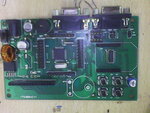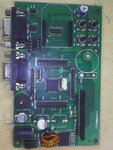chamanlatapankaj
Newbie level 5

- Joined
- Jul 25, 2015
- Messages
- 9
- Helped
- 0
- Reputation
- 0
- Reaction score
- 0
- Trophy points
- 1
- Activity points
- 66
i am working on ARM LPC2148 KIT .The kit is isprogrammed by using flash tool correctly but there is no change on PINS Signal,but the program written is properly working in Proteus.
Thanks in Advance
Thanks in Advance


